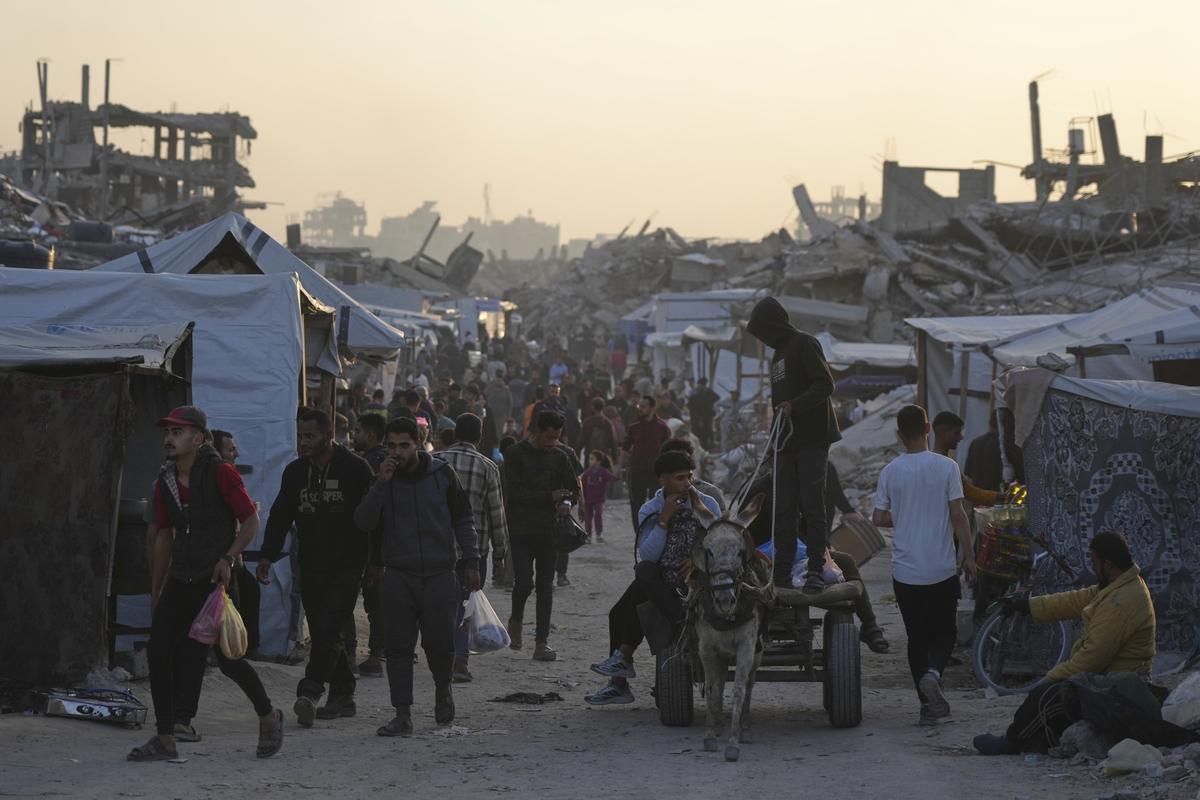(This article is part of the View From India newsletter curated by The Hindu’s foreign affairs experts. To get the newsletter in your inbox every Monday, subscribe here.)
“Super afraid” – that’s how Columbia University doctoral student Ranjani Srinivasan feels after self-deporting to Canada. U.S. immigration and customs enforcement agents raided her apartment on the campus housing, claiming she was a “Hamas sympathiser”, and she was forced to take refuge in Canada.
Speaking to The Hindu’s Kallol Bhattacherjee in an online interview from an undisclosed location in Canada, Ms. Srinivasan, who is in her fifth year of PhD, said she is “super afraid of retaliation” and that she is not yet aware of what specific charges were brought against her by the American authorities that led to her being “disenrolled” from the university just six months before she was to complete her PhD.
In this screenshot from a video posted by @Sec_Noem via X on March 14, 2025, Ranjani Srinivasan, an Indian citizen who participated in pro-Palestinian protests at United State’s Columbia University, leaves the country after her visa was revoked by the Department of State. Photo: X/@Sec_Noem
| Photo Credit:
X/@Sec_Noem
Prior to her case, the March 8 arrest of Mahmoud Khalil, a Columbia University graduate who became a leader of pro-Palestinian protests on the campus, drew global attention. According to media reports, the Trump administration sought to deport Mr. Khalil, a legal permanent resident of the United States. On Friday (March 14, 2025), Immigration officials announced the arrest of a second person who participated in Pro-Palestinian protests at Columbia University. That the Trump administration has decided to construe any condemnation of Israel’s brutal war on Gaza as support for terrorism has set off panic among students. While the developments are widely seen as emblematic of the regime’s targeted attack on those expressing solidarity with Palestine, universities are faced with many questions. Almost daily, students are confronting new realities about their altered visa statuses, funding cuts, and a rapid reconfiguration of the university system itself. Their visas and academic futures have never looked more precarious.

Palestinians walk amid the rubble of destroyed homes and buildings in Jabaliya, northern Gaza Strip on Friday, March 14, 2025. (AP Photo/Jehad Alshrafi)
| Photo Credit:
Jehad Alshrafi
Meanwhile in Gaza, the January 19 ceasefire agreement has hardly brought respite to survivors. At least five Palestinians were killed, including two local journalists, and others wounded on Saturday (March 15, 2025) in an Israeli strike on Gaza’s northern Beit Lahiya town, medics told Reuters. Witnesses and fellow journalists said the people in the car were on a mission for a charity called Al-Khair Foundation in Beit Lahiya, and they were accompanied by journalists and photographers when the strike hit them, the news agency reported, pointing to the “fragility” of the ceasefire.
Our Foreign Affairs Editor Stanly Johny reviewed some recent books on Palestine. Pankaj Mishra’s The World After Gaza; Raja Shehadeh’s What Does Israel Fear from Palestine?; and Antony Loewenstein’s, The Palestine Laboratory: How Israel Exports the Technology of Occupation Around the World. “How did Israel, founded by a people who were victimised by Nazism, become an “inhuman victimiser?” How can the liberal “gentile” West not be bothered by the mass violence Israel is committing against the Palestinians? In The World After Gaza, Mishra seeks to understand the shrinking grey zone between the victim and the victimiser,” he writes.
Top 5 stories this week:
1. Terror on the train: The Hindu editorial on Pakistan and its Balochistan province
2. Kallol Bhattacherjee writes on the Baloch Liberation Army, the rebels who shook Pakistan
3. Sri Lanka’s Parliament will debate a nearly three-decade-old report probing allegations of unlawful detention, torture, and extrajudicial killings by the State between 1988 and 1990, the ruling National People’s Power [NPP] government has said.
4. Rare success: The Hindu editorial on the International Criminal Court and Duterte arrest
5. New Delhi is hosting the annual Raisina Dialogue from March 17-19, 2025. Who are the newsmakers attending the 10th edition this year? Will Ukraine war, tariffs threatened by U.S. President Donald Trump, relations with China dominate proceedings? Why are leaders from West Asia and South East Asia not well represented? What about Pakistan? – Our Diplomatic Affairs Editor Suhasini Haidar tells us what to expect from the foreign policy bash.
Published – March 17, 2025 02:01 pm IST
